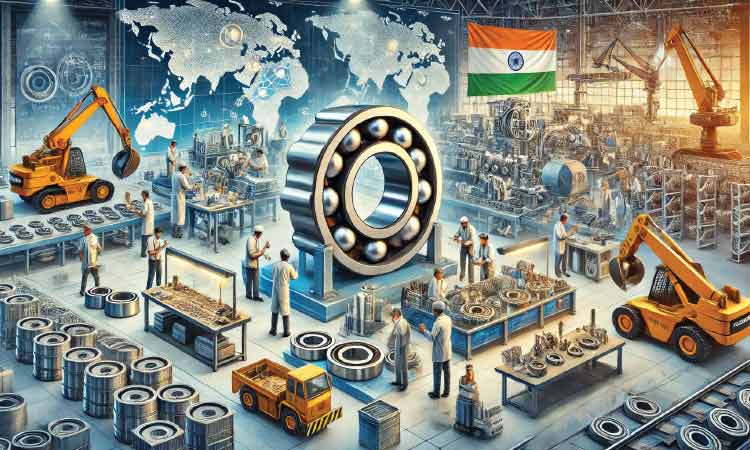The Indian industrial bearings industry is a crucial enabler of manufacturing and infrastructure development, serving diverse sectors such as automotive, railways, aerospace, heavy machinery, and renewable energy. With a strong mix of domestic manufacturing and imports, India has established itself as a significant player in the global bearings market, both as a producer and consumer.
Market Overview and Growth Drivers
India’s bearings industry has witnessed steady growth over the past decade, driven by rapid industrialization, increasing infrastructure projects, and the expanding automotive sector. The market is estimated to grow at a CAGR of 6-8% over the next few years, supported by rising demand in construction, steel, cement, and mining industries. Government initiatives like ‘Make in India’ and the Atmanirbhar Bharat (Self-Reliant India) campaign have also spurred domestic production, reducing dependency on imports and encouraging global companies to set up manufacturing units in the country.
The Indian bearings industry is characterized by a mix of global giants and homegrown manufacturers. Companies like SKF, Timken, Schaeffler, and NSK have a strong presence in India, alongside Indian players such as National Engineering Industries (NBC Bearings), Tata Bearings, and NRB Bearings. The industry is seeing increased investments in technology and R&D, with a focus on enhancing efficiency, reliability, and sustainability.
Types of Bearings and Their Industrial Applications
Industrial bearings come in various types, each serving specific applications. The most common ones include:
- Ball Bearings: Used in electric motors, fans, gearboxes, and household appliances due to their ability to handle light to moderate radial and axial loads.
- Roller Bearings: Available in cylindrical, spherical, and tapered configurations, these bearings are widely used in heavy industries such as steel, cement, and mining.
- Needle Bearings: Common in automotive transmissions and industrial machinery where space constraints exist.
- Thrust Bearings: Employed in high-load applications such as cranes, turbines, and marine propulsion systems.
- Plain Bearings: Found in construction equipment, aerospace applications, and oil & gas industries due to their ability to operate in extreme conditions.
The Indian railway sector is a major consumer of industrial bearings, requiring specialized products that ensure durability and reliability. Aerospace and defense applications also demand high-precision bearings that adhere to stringent quality standards. As these sectors continue to expand, the demand for advanced bearing solutions will rise accordingly.
Technological Advancements and Innovations
The Indian bearings industry is increasingly focusing on advanced materials and smart manufacturing processes to enhance performance and longevity. Key trends include:
- Hybrid Bearings: The combination of ceramic rolling elements with steel rings improves durability, making them ideal for high-speed and high-temperature applications.
Sealed and Lubricated-for-Life Bearings: These reduce maintenance needs and enhance operational efficiency, particularly in industrial automation and robotics. - Condition Monitoring and Predictive Maintenance: Bearings integrated with sensors and IoT-enabled monitoring systems are gaining traction, allowing for real-time performance tracking and failure prevention.
- Energy-Efficient Bearings: Designed to minimize friction and heat generation, these bearings contribute to reduced energy consumption and longer service life.
Challenges and Roadblocks
Despite its promising growth trajectory, the Indian bearings industry faces several challenges. One of the biggest hurdles is the availability of raw materials, particularly high-quality steel, which directly impacts the production cost and quality of bearings. Additionally, the market is highly competitive, with price pressures from low-cost imports, particularly from China. To combat this, Indian manufacturers are investing in automation and lean manufacturing practices to enhance efficiency and cost-effectiveness.
Another challenge is the counterfeit bearings market, which not only affects the revenues of legitimate manufacturers but also poses serious safety risks in critical applications. Industry stakeholders are increasingly working with regulatory authorities to curb the circulation of counterfeit products through stringent quality checks and awareness campaigns.
The Sustainability Imperative
With growing environmental concerns, sustainability has become a key focus area for the bearings industry. Manufacturers are exploring the use of recycled materials, eco-friendly lubricants, and energy-efficient production processes to reduce their carbon footprint. Circular economy principles, where bearings are refurbished and reused instead of discarded, are also gaining momentum. Companies are investing in remanufacturing units that refurbish used bearings to extend their lifecycle, thereby reducing waste and promoting sustainability.
Future Outlook
The future of the Indian industrial bearings industry looks promising, with continued investments in R&D, digitalization, and automation. The push for localization under the ‘Make in India’ initiative will further boost domestic manufacturing capabilities. Additionally, the increasing adoption of Industry 4.0 technologies, such as AI-driven predictive maintenance and digital twins, will transform the way bearings are designed, monitored, and maintained.
As industries such as electric vehicles (EVs), wind energy, and robotics gain momentum, the demand for specialized bearings will rise. The automotive sector, in particular, is undergoing a major shift toward EVs, necessitating the development of lightweight, low-friction bearings that enhance efficiency and performance.
Conclusion
The industrial bearings milieu in India is at an exciting crossroads, driven by technological advancements, evolving market dynamics, and policy support. While challenges such as raw material availability, competition, and counterfeit products persist, the industry is poised for sustained growth. With a focus on innovation, sustainability, and localization, India’s bearings sector is well-positioned to cater to the rising domestic demand while strengthening its footprint in the global market.



